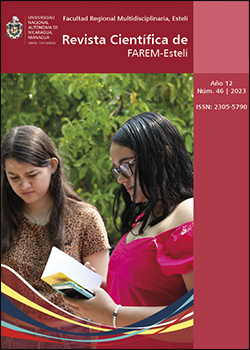Action Guiding Bases for the development of Physics topics with a competency-based appro
DOI:
https://doi.org/10.5377/farem.v12i46.16477Keywords:
Particle Mechanics, learning strategies, Bases for Action Orientation (BOA), Competency-based learningAbstract
The present research was carried out at the Multidisciplinary Regional Faculty of Estelí, with the objective of validating the Bases for Action Orientation (BOA) for the development of Physics topics in the Particle Mechanics Component, which contribute to the competency-based learning of students in the Physics-Mathematics program. It is a study with applied and descriptive methodology, with a mixed approach, under a sociocritical paradigm; the population is formed by 214 students and 18 teachers of the Physics-Mathematics career, using a non-probabilistic sample by convenience for the selection of the sample, corresponding to 32 students of the first year who receive the Particle Mechanics component, with whom questionnaires and surveys were applied for data collection; which were analyzed through analysis, synthesis and graphics, for the interpretation of the same. BOA were designed for each topic and its corresponding class plan, taking into account the different stages of the teaching-learning process. From the application of the BOA for the facilitation of the component, it is determined that they contribute to the learning by competences, providing tools that allow the students to have a greater disposition to appropriate the contents.
Downloads
References
Aburto Jarquín, P. A. (10 de Mayo de 2020). UNAN Managua. Obtenido de https://www.unan.edu.ni/wp-content/uploads/Las-BOA-Pedro-final-190520_compressed.pdf
Arias Odón, F. G. (2012). El proyecto de investigación. Introducción a la metodología científica (Sexta ed.). Caracas: EPISTEME.
Arnal, J., Del Rinco, D., & Latorre, A. (1992). Investigación Educativa. Fundamentos y Metodología. Barcelona: Labor S.A.
Baena Paz, G. (2017). Metodología de la Investigación. México: Grupo Editorial Patria.
Cabezas Mejía, E. D., Andrade Naranjo, D., & Torres Santamaría, J. (2018). Introducción a la Metodología de la Investigación Científica. Sangolquí: Universidad de las Fuerzas Armadas ESPE.
Gallardo Echenique, E. E. (2017). Metodología de la Investigación - Manual auto formativo interactivo. Huancayo: Universidad Continental.
García Dihigo, J. (2016). Metodología de la Investigación para administradores. Bogotá: Ediciones de la U.
Hernández Sampieri, R., Fernández Collado, C., & Baptista Lucio, M. d. (2014). Metodología de la Investigación (Sexta ed.). México: McGRAW-HILL.
Herrera Castrillo, C. J. (2023). Metodología para el Aprendizaje por Competencias de Ecuaciones Matemáticas en Física al utilizarse Tecnología. Trabajo Final de Doctorado Para optar al grado de: Doctor en Matemática Aplicada, Jinotepe, Nicaragua.
Latorre, A. (2005). La investigación acción. Conocer y cambiar la práctica educativa. Barcelona: Graó.
Mendoza Juárez, Y. L., & Mamani Gamarra, J. E. (2012). Estrategias de Enseñanza - Aprendizaje de los docentes de la Facultad de Ciencias Sociales de la Universidad Nacional del Altiplano - Puno 2012. COMUNI@CCION: Revista de Investigación en Comunicación y Desarrollo, 58-67. Obtenido de https://www.redalyc.org/pdf/4498/449845035006.pdf
Triminio Zavala, C. M. (2022). Competencias Profesionales en el Prácticum de Física Matemática. Trabajo Final de Doctorado Para optar al grado de: Doctor en Educación e Intervención Social, Estelí, Nicaragua. Recuperado el 15 de junio de 2023, de https://repositorio.unan.edu.ni/18363/2/18363.pdf
UNAN-Managua. (2021). Documento curricular Carrera Física-Matemática. Managua
Fundación Universia (2019). ¿Qué es el aprendizaje por competencias? Recuperado de: https://www.universia.net/es/actualidad/orientacion-academica/que-aprendizaje-competencias-1163670.html
Quass, C., & Crespo, N. (2003). ¿Inciden los métodos de enseñanza del profesor en el desarrollo del conocimiento metacomprensivo de sus alumnos? Revista Signos, 36(54).
Published
Issue
Section
License
Copyright (c) 2023 Revista Científica de FAREM-Esteli

This work is licensed under a Creative Commons Attribution-NonCommercial-ShareAlike 4.0 International License.



